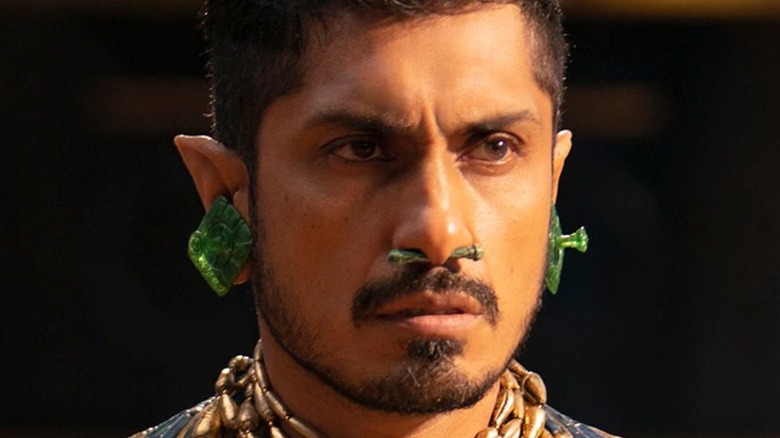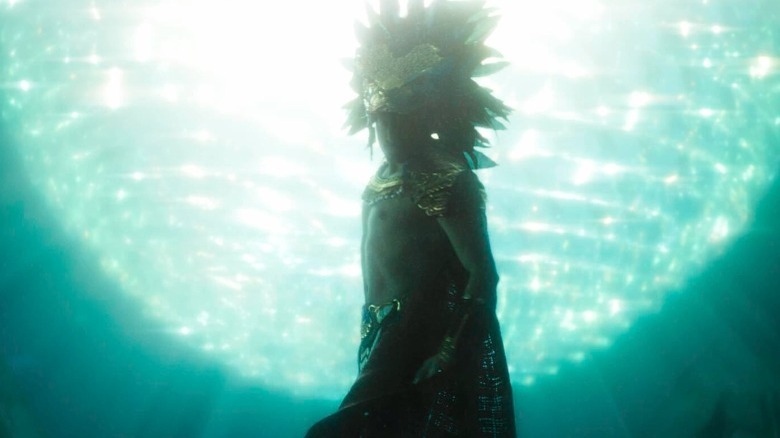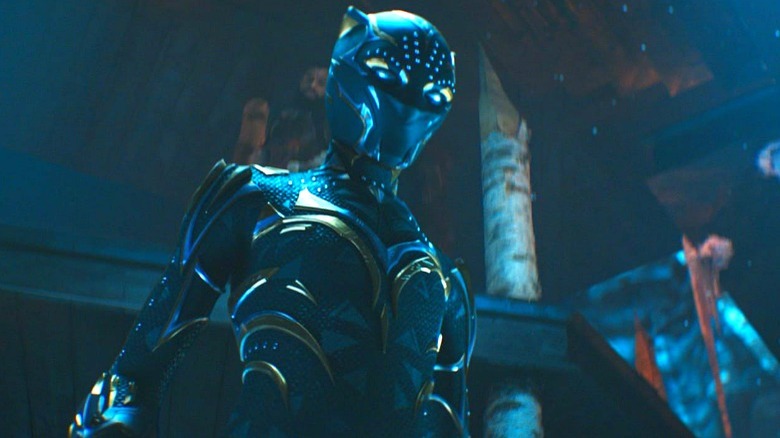Namor Actually Wins In Wakanda Forever (Despite Losing)
Warning: Spoilers for "Black Panther: Wakanda Forever."
Namor (Tenoch Huerta) has a significantly different origin story in "Black Panther: Wakanda Forever" than he does in the comics. The film gave Namor the nickname "K'uk'ulkan," a term that, according to World History Encyclopedia, is the name of a feathered serpent god in Mesoamerican mythology. This was part of the movie's rewrite of Namor where, instead of being the ruler of Atlantis, he rules over Talokan, a hybrid of Atlantis from the comics and Tlalocan–the level of the afterlife reserved for those who died water-related deaths–in Aztec mythology (per Mythopedia). This gave the film both a chance to avoid confusion with the DC Universe which already has a superhero living in Atlantis and a chance to create a rich backstory for yet another culture that, like Wakanda, was founded by people of color and flourished into something beyond what western society has achieved.
In an interview with the Los Angeles Times, Huerta talked about what it meant to him to be playing a character in the Marvel Cinematic Universe that has darker skin. "This is the first superhero with an Indigenous background, a Mesoamerican background," Huerta told the Times. "It's a brown-skinned guy. This ancient culture is in his roots. And he speaks like me. We are making history. I told them, 'Let's do something to be proud of.'" In the comics, Namor is the son of an English explorer and Princess Fen of Atlantis, giving him none of the Mesoamerican origins that he has in the movie.
Namor is a complex character that shifts between hero and villain in the comics, and, while he seems to be bested by Shuri (Letitia Wright) at the end of "Black Panther: Wakanda Forever," did he not get exactly what he wanted?
Namor gets an alliance with Wakanda, which is what he wanted in the first place
At the end of "Black Panther: Wakanda Forever," Shuri defeats Namor and has mercy on him, offering to let him yield. He does so, and the two fly back to their warriors together, demonstrating the truce. Later, Namor reveals to Namora (Mabel Cadena) that he believes the surface world will come for Wakanda, thanks to their vibranium, and when that happens, Wakanda will look to Talokan as an ally.
This is a pretty good outcome for Namor as this is basically what he wanted from the beginning. Namor originally went to war with Wakanda because they refused to turn over the young scientist who built the vibranium-detecting vessel, Riri Williams (Dominque Thorne), nor agree to go to war with him against the surface world that's actively searching for the vibranium that powers both of their nations. Of course, Wakanda was not ready to immediately wage war on all the non-vibranium-producing countries of the world, but this truce signifies that they may be willing to align with Talokan in the future, should they ever find themselves under attack.
According to Time Magazine, Namor will be returning, although they seem to be basing this more on the position that Namor finds himself in at the end of the movie rather than any official announcement from Marvel. However, it is true that Namor is set up at the end of the film to be an ongoing character in the MCU, but will it be as a villain or as a hero?
Is Namor good or evil?
In the comics, Namor was introduced in 1939 in "Motion Picture Funnies Weekly" #1. In his first appearance, Namor viciously attacks the crew of a salvage vessel trying to bring up lost treasure. However, this is followed by Namor's mother telling him the story of why they don't trust surface-dwellers as some of them attacked Atlantis and killed many of their people. So even in his brutal first appearance, Namor's actions can be justified as self-defense.
Namor exists in a sort of moral gray area in the comics, often switching sides between heroes and villains and never really settling down as one or the other. In "X-Men" #6 in 1964, Magneto tries to get Namor to join his Brotherhood of Evil Mutants, but Namor quickly becomes disenchanted with Magneto's leadership and turns on him. In "Dark Avengers" #8, Namor joins the X-Men, making him technically part of a superhero group. Still, even in his time with the X-Men, Namor is morally ambiguous. In "Avengers vs. X-Men" #8, the comic story that almost certainly inspired a scene in "Black Panther: Wakanda Forever," Namor floods Wakanda during a conflict with the Avengers in defiance of direct orders from Cyclops.
It's hard to call the MCU's version of Namor either good or evil, either, as he's protecting his nation from a legitimate threat from the people of the surface. As misguided as his actions may be, his motives are just, putting him in a similar level of moral ambiguity to some other MCU villains like Vulture or Killmonger. And with the movie leaving the door open for Namor to return, it's possible he'll return as an antihero, rather than the main antagonist.


